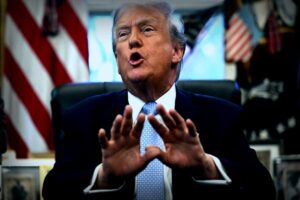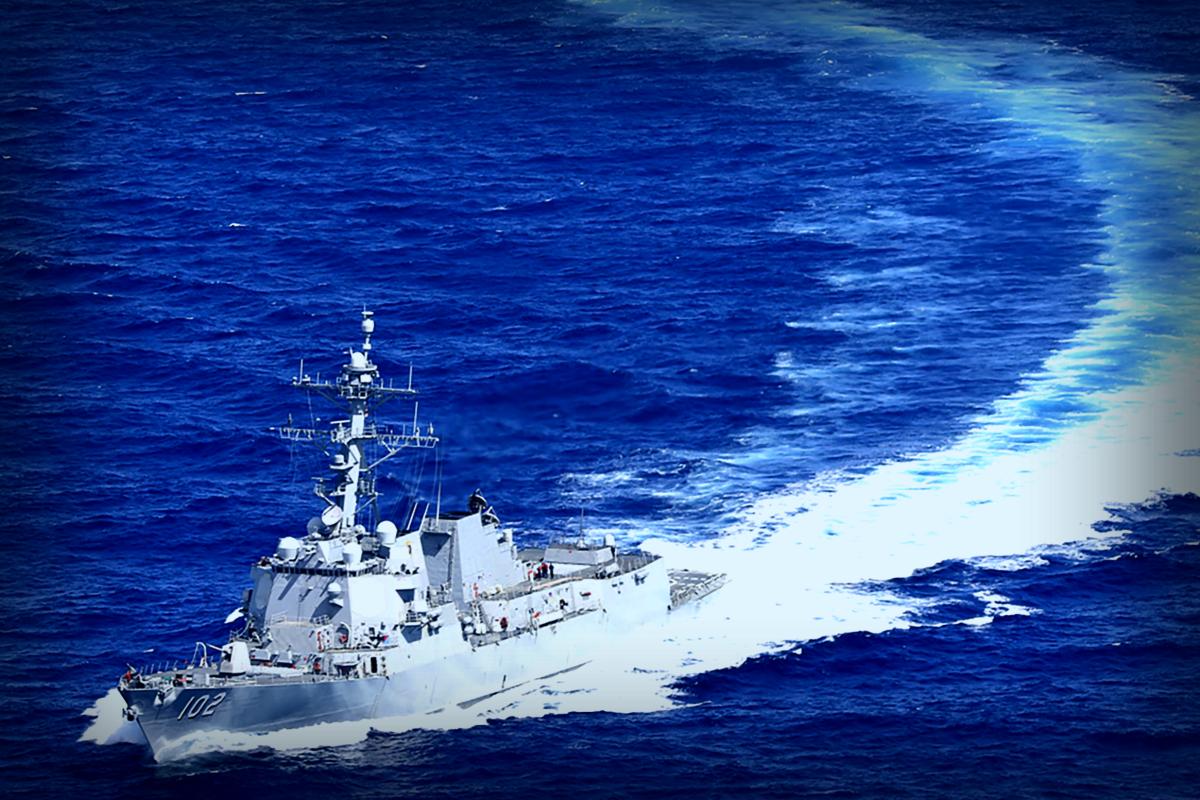The U.S. is ramping up its military presence near Venezuela with three Aegis guided-missile destroyers as part of President Donald Trump’s initiative to combat drug cartels in Latin America, according to a government official familiar with the details.
The destroyers, USS Gravely, USS Jason Dunham, and USS Sampson, are expected to make their way to the area soon. This information was disclosed to the Associated Press by an anonymous source on Tuesday, who was not authorized to speak on the matter. A White House spokesperson later confirmed the deployment in an email to Newsweek.
During the press briefing on the same day, White House Press Secretary Karoline Leavitt commented regarding the mission. She stated, “The president is ready to utilize all American resources to prevent drugs from infiltrating our nation and ensuring that those responsible face justice. The current regime in Maduro’s Venezuela is not a legitimate government but a narcotics terror cartel.”
Another official from the Defense Department confirmed that U.S. Navy ships had been assigned to support anti-drug operations, asserting that these ships would engage in a phased deployment over several months.
This military action emphasizes Trump’s aggressive strategy to combat acute drug trafficking and street violence resulting from the cartel’s influence, particularly concerning substances like fentanyl in American neighborhoods.
Furthermore, Trump has been urging Mexican President Claudia Sheinbaum to adopt a firmer approach against these crime organizations in contrast to her predecessor’s policies. However, Sheinbaum has been firm in asserting Mexico’s sovereignty, turning down proposals from Trump concerning U.S. military intervention.
In February, Trump categorized groups like Venezuela’s Tren de Aragua, El Salvador’s MS-13, and various Mexican organizations as foreign terrorist entities. The Trump administration has also bolstered immigration enforcement measures against alleged gang members.
This Monday, Venezuelan President Nicolás Maduro spoken out against the intensified U.S. threats and vowed to mobilize a large militia of over 4.5 million members nationwide. These militia elements, established by former President Hugo Chávez, are made of volunteers ready to assist the armed forces against both international and domestic aggressions.
“The empire has completely lost its mind and has stepped up its hostilities towards Venezuela’s peace,” Maduro remarked in a conference held in Caracas, without specifying any U.S. actions.
Earlier this month, the Trump administration upped the ante, doubling the reward for Maduro’s capture to $50 million, citing his role as a leading narcotics trafficker and connection to cartels orchestrating fentanyl trafficking into the U.S.
Maduro, who was indicted in a New York federal court back in 2020 during Trump’s presidency for narcotic terrorism and colluding with drug trafficking efforts, had a bounty of $15 million placed on him back then.
Venezuela’s Significance to the U.S.
Venezuela boasts some of the largest proven oil reserves globally, placing it at a pivotal point in U.S. foreign policy discussions, as noted by the Energy Information Administration. The political turmoil and economic strife under Maduro’s regime have sparked widespread migration across the Americas, making the situation there even more relevant. Moreover, Venezuela’s connections to Russia, China, and Iran raise its strategic importance.
Travel Concerns for Venezuela
The U.S. State Department advises against traveling to Venezuela, highlighting rampant crime, instability, a lacking healthcare system, and arbitrary detentions by security forces. Previous reports suggest Caracas and major urban areas experience some of the highest homicide rates in the Western Hemisphere. While some U.S. citizens do travel for family or business reasons, officials alert travelers to proceed with caution due to unpredictable and hazardous conditions.
Understanding Latin American Drug Cartels
Latin American drug cartels are a dominant force in the cocaine and fentanyl trade into the U.S., as highlighted by the Drug Enforcement Administration. The notorious Sinaloa and Jalisco New Generation cartels in Mexico, together with Venezuela’s Tren de Aragua, leverage violence, corruption, and established smuggling paths to maintain and expand their operations, yielding billions of dollars and contributing to devastating overdose statistics.
Expert Insights
Henry Ziemer, Associate Fellow at the Center for Strategic and International Studies, said via email to Newsweek: “The deployment of these ships is significant and brings new operational capabilities, particularly in detecting narcotics traffic, including sophisticated narco-submarines commonly used by traffickers. Yet, such a heightened military presence may be excessive for mere narcotics control, suggesting it serves as a display of strength toward President Nicolás Maduro.
Ziemer continued, “While fears abound regarding an impending military strike against Venezuela, particularly with discussions surrounding kinetic action against drug cartels in U.S. military channels, it appears this move is more on showcasing resolve, rather than gearing up for an invasion.”
Venezuela’s Foreign Minister Yvan Gil, without directly referencing the destroyers, responded to U.S. drug trafficking allegations: “Washington’s attempt to vilify Venezuela points to its eroding credibility and failed strategies in our region. As Washington threatens, Venezuela perseveres in securing peace and sovereignty. Real progress against crime stems from respecting the sovereignty of nations, and each aggressive allegation only strengthens the resolve of a free Venezuelan society.”
Update: 8/19/25, 2 p.m. ET: This article has been revised with current statements.
Update: 8/19/25, 2:53 p.m. ET: Further updates have been added to the original content.
Update: 8/19/25, 6:20 p.m. ET: New developments and remarks have been included again in the article.
This report incorporates contributions from the Associated Press.




















